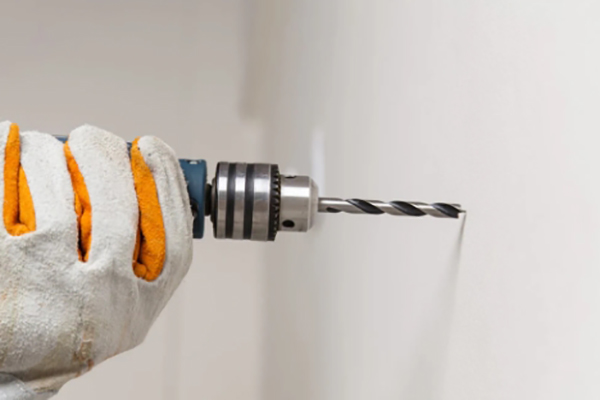What Is a Drilling Anchor?
A drilling anchor is a fastener designed to securely hold objects onto materials that might not support the weight of the item on their own, such as drywall, concrete, brick, or plaster. The anchor expands or grips the material, distributing the load and preventing the screw from pulling out. Anchors are commonly used in materials where screws alone won’t hold, like hollow walls or concrete. There are various types of anchors, including plastic, metal, toggle, and sleeve anchors, each requiring specific drill bits for proper installation.
Choosing the Right Drill Bit for Different Anchor Types
- Plastic Wall Anchors (Expansion Anchors)
Plastic wall anchors are one of the most common types used in drywall or plaster for lightweight tasks such as hanging picture frames or small shelves. These anchors expand when a screw is inserted, providing a firm grip inside the hole.
For plastic wall anchors, it’s essential to use a drill bit that matches the diameter of the anchor. Typically, the size of the bit needed is written on the packaging of the anchor (e.g., a 1/4-inch anchor will require a 1/4-inch drill bit). A masonry bit may be necessary if drilling into harder materials like brick or concrete, but for drywall or plaster, a regular twist drill bit works perfectly.
- Metal Anchors (Molly Bolts)
Metal anchors, also known as molly bolts, are used in hollow walls for more heavy-duty installations. They are ideal for supporting larger loads, such as TV mounts or cabinets. Molly bolts are designed to expand behind the wall once installed, offering greater holding power.
For molly bolts, selecting the correct drill bit size is crucial. Since molly bolts require a snug fit, using a bit slightly smaller than the diameter of the anchor ensures it grips the wall properly. A standard twist drill bit works well for drywall, but if you’re working with harder surfaces, a masonry bit or multi-purpose bit may be needed.
- Toggle Bolts
Toggle bolts are designed for hollow walls like drywall, plaster, or ceiling installations. They feature a pair of metal "wings" that fold in to fit through a hole and then expand on the other side, offering substantial holding power.
Drilling for toggle bolts requires a hole large enough to accommodate the folded wings of the bolt. The correct drill bit size will often be marked on the bolt packaging. For example, a 1/4-inch toggle bolt might require a 1/2-inch drill bit to fit the wings through the hole. A spade bit or auger bit may be helpful if you need to create larger holes in wood, while a masonry bit is preferable for concrete or brick walls.
- Sleeve Anchors
Sleeve anchors are typically used in concrete, masonry, or stone and are perfect for heavy-duty installations, such as securing metal brackets or outdoor equipment. They work by expanding within the drilled hole as the bolt is tightened, providing a firm hold in solid materials.
For sleeve anchors, it’s important to match the drill bit size to the anchor's diameter exactly. In most cases, a masonry drill bit is required to penetrate concrete or brick. These bits are designed with a hardened tip that can break through tough materials without dulling or breaking. For example, a 3/8-inch sleeve anchor will need a 3/8-inch masonry drill bit for a precise fit.
- Concrete and Masonry Anchors
Concrete and masonry anchors are used when attaching items directly to concrete, brick, or stone. They are often heavy-duty and used for industrial, commercial, or large-scale residential projects. These anchors require robust drilling tools to create proper holes in such hard surfaces.
The correct drill bit for masonry anchors is a masonry drill bit. These bits are designed to withstand the hard, abrasive nature of stone, brick, and concrete. The bit size must precisely match the diameter of the anchor, which is typically indicated on the anchor packaging.
Drill Bit Materials and Coatings
When selecting a drill bit for your anchor installation, it's important to consider the material of the bit itself. Drill bits are made from various materials, each offering different levels of performance based on the project.
- High-speed steel (HSS) drill bits are versatile and work well in most wood and plastic anchor installations.
- Cobalt bits are ideal for tougher materials like metal or harder woods.
- Carbide-tipped masonry bits are essential when drilling into concrete or brick. These bits are designed to withstand the heat and friction generated by drilling hard surfaces.
Many drill bits also feature coatings such as titanium or black oxide, which help reduce friction and increase the durability of the bit. Choosing the right coating can help extend the life of the bit, particularly when working with challenging materials like concrete or stone.
Conclusion
Selecting the right drilling anchor and corresponding drill bit is essential for achieving a strong, secure hold in any material. Whether you're working with drywall, wood, concrete, or masonry, matching the drill bit size and type to your anchor ensures the success of your installation. By using the appropriate bit, you minimize the risk of damage to the wall or the object being mounted, while also providing the necessary strength and stability for the anchor to hold.
Post time: 9 月-14-2024















